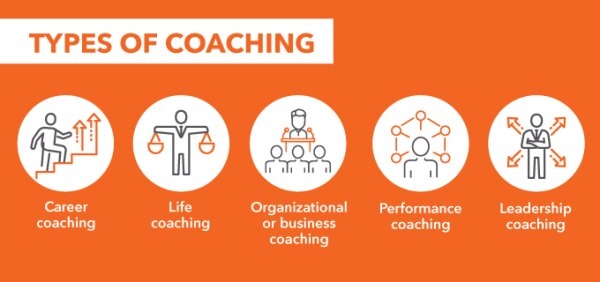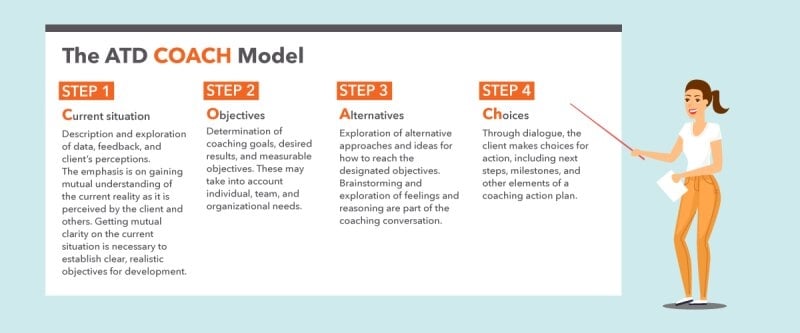Coaching: Definition, Benefits and Types
For a deeper understanding of the concept of (administrative or executive coach), we have to know what is the meaning of coach.
As defined by International Coaching Federation (ICF), coaching is a partnership with the client in an inspiring experience that stimulates creative thinking to enhance their effectiveness and efficiency in life and work. Coaching is a client-oriented process unlike other similar professions such as counseling, consulting, and training, which is led by a trainer, consultant, or coach.
What is leadership coaching?
The Leadership coach provides a secure, cohesive, trusting, and supportive environment for such clients. The coach also contributes to the understanding and comprehension of these leaders of their capabilities and how others see them. In addition, it contributes to clarifying the goals for the client and supporting them to reach the best way to achieve them.
While the ATD model of coaching continues to be widely accepted and used by many personal coaches, many coaches also use the GROW model that appeared in 1980. The letters in the word GROW summarize the following words:
- G: Goal.
- R: Reality.
- O: Options.
- W: Way forward.
There are also many other forms of coaching, such as:
- FUEL Coaching.
- SOAR Coaching.
- Fierce Conversation Coaching.
- Purpose Coaching.
- Perspective Coaching.
- Process Coaching.
All models contain similar methods that help the client discover their view of reality, their beliefs, and goals, and contribute to their ability to discover available options and opportunities and choose the optimal path to achieve their goals. All of the above is totally dependent on the coach’s ability to build a relationship based on trust and maintaining the confidentiality of the client’s information.
Types of Coaching:
Leadership guidance is not the only type of coaching in the professional world. Many managers in the world are developing their coaching skills in order to improve their performance to get promotions and enhance their leadership skills. There are internal and external personal coaches who provide different types of support.

Career Coaching:
Career coaching provides support for employees who wish to change their career paths. This includes short or long-term changes, including guidance on career development and ways to search for work. Personal coaches also make it easier to write a resume, search for jobs, improve online profiles, and pass interviews.
Life coaching or Personal coaching?
While this type of coaching (Life coaching) is not the most popular type of personal coaching within organizations, the presence of personal life coaches is still important within organizations. This coaching specialization focuses on enhancing a variety of aspects of a person's life, including lifestyle, health, fitness, finances, relationships, and spiritual or religious growth.
Organizational coaching or Business Management coaching?
This type of coaching provides business owners and entrepreneurs with adequate support to set goals and develop strategies to reach the goals and improve overall performance.
Coaching for Performance Follow-up:
It supports people working to improve their overall performance at work regardless of their job position.
Leadership coaching:
It is suitable for those who wish to develop their leadership skills regardless of their actual professional roles.
ATD model in coaching:
While the ATD model of coaching continues to be widely accepted in personal coaching, many personal coaches have been using the GROW model since the 1980s to support businesses and employees.

GROW model:
All models have similar elements in discovering the client’s perspective and reality, setting goals, presenting different perspectives or options, then choosing the best course of action and moving forward toward the desired state. All of that is done by building a relationship with the client that is characterized by trust, privacy, and confidentiality.
Many people confuse the concept of coaching with other similar concepts such as: counseling, management consulting or psychological consulting. The difference is in the following:
- Coaching does not provide psychological treatment such as counseling sessions or psychotherapy according to Merriam Webster’s translation of “Psychological Counseling for the individual through the use of methods and theories in psychology, especially in collecting case history data during the last period, and using different methods of personal interview, interests and abilities test, which is concerned with a person's past, while coaching is concerned with a person's future.
- Mentoring is also a long-term relationship between two parties seeking professional development, during which the coach exercises the bulk of talking and giving advice. While in coaching the relationship is a true partnership relationship between equal persons, while in the mentoring relationship the relationship is between two people, one of whom is more aware and experienced than the other.
- Coaching works to support the client to move forward to achieve their goals and dreams. It is directly related to what the client personally wants and the coach has no relationship or the slightest influence on the client's will or desires. The coach has no authority to delve into the specifics or past of the client unless the client takes the initiative to delve into them or touch upon them themselves. In coaching, we see that the client is always in control of the conversation.
- Since the coaching deals with sensitive issues and the privacy of clients, and accordingly, there are laws and regulations for professional conduct that govern, protect, and maintain this relationship, developed by professional organizations such as ICF & ATD. The coach must abide by them when practicing coaching sessions. These laws include honesty, justice, and integrity, empathy, respect, loyalty and responsibility.
For more content about coaching, you can refer to the ICF or ATD website, where they have content and also provide international professional certifications in coaching.